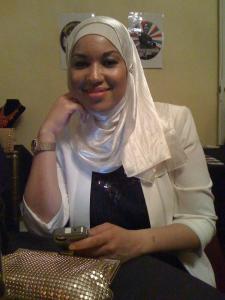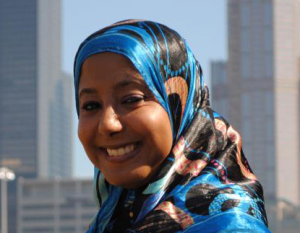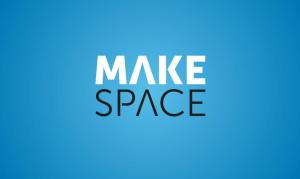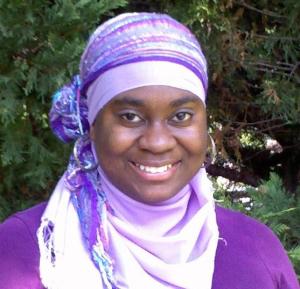
Sakeena Abdulraheem is one of the founding members of the Falling Walls Initative. She holds an BA in Spanish and International Studies from Meredith College, and an MA in Islamic Studies from the Graduate School of Islamic and Social Sciences. She is currently completing her MA in counseling psychology with a concentration in trauma and crisis intervention. She has extensive experience working as a teacher, mentor, and consultant. Sakeena currently counsels victims of domestic violence as an interning therapist at the House of Ruth MD.
MH: Tell us more about your academic path that led you to pursue counseling.
My background was actually not in counseling. In undergrad I double majored in Spanish and International studies. By my senior year in college I was fluent in Spanish and I knew I wanted to make a positive impact on a global level but I was still exploring career options at that point. By the end of my senior year in 2002 I was hired by the defense department was waiting for my security clearance to go through and so I began substitute teaching and got involved in education before I eventually made my move to the Washington, DC area from the Raleigh-Durham, NC area. After working for two years in government I decided that it was time to explore other fields with my skillet where I could see the impact of my contributions more immediately and directly. I had gotten my MA in social studies with a concentration in Islamic Studies from The Graduate School of Islamic and Social Sciences and I began entertaining the idea of becoming a teacher. I worked for about 4 years in the educational system working with elementary school aged youth that had aspergers, autism, ADHD, and bipolar disorder. I saw the various ways in which emotional well being, and mental disorders not only had an impact on the environment of the classroom, teachers struggled through curriculum working with children with complex behavioral problems that quite frankly they were not trained to deal with in an educational setting. As a result, I immediately began applying to counseling graduate school programs because I saw mental health being the way in which I would be able to contribute towards and give back overall to the community.
MH: Tell us more about what got you interested in counseling and specifically in domestic violence?
While I was teaching full time in before and after school programs I started my graduate program part time in counseling psychology. At the beginning of the program I was planning to concentrate and specialize in children and adolescents because of my work history of seeing mental illness in elementary school age children. However, it was my study abroad trip at the beginning of my graduate program to Kigali, Rwanda, to study and learn about programs and non-profits working towards addressing trauma and Post-Traumatic Stress Disorder in the context of genocide that influenced my decision to change my specialization. During my trip I had the opportunity to meet survivors that were working as educators and heads of non-profit organizations and professors in the department of psychology that spoke first hand of their personal experiences during the genocide in 1994. I was also exposed to the cases of gender-based violence that were used as weapons against the tribe that was being killed at that time. Rape, sexual assault, various parts of the female anatomy were being cut off during the genocide in an effort to terrorize and instill fear in the population and specifically the female population. After the genocide many women were dealing with various psychological problems that would go untreated and many had to undergo abortions because they were victims of rape during the genocide. Looking at all of these factors, I realized that I wanted to continue learning about Post traumatic Disorder under various context and I also realized that is was this particular type of population that I wanted to work with and that this was the area of counseling that I wanted to continue to pursue. After returning from the trip I immediately changed my concentration from children and adolescents to trauma and crisis intervention. Trauma and crisis intervention is inclusive of various population and victims of domestic violence are a part of this population. I began interning as a therapists since last year for a non-profit organization, The House of Ruth MD that works specifically with domestic violence victims at their counseling center.
MH: Tell us more about the Falling Walls Initiative. What was the idea behind it? What do you plan to do?
Falling Walls is an initiative that was inspired by a research project led by one of the founding members Darakshan Raja. The study looked at crime victimization in the American Muslim Community. This study in particular highlights that denial is a major problem in the American Muslim community when it comes to addressing abuse, domestic violence, and victimization overall. One of the main goals of the Falling Walls Initiative is to break barriers such as denial with the Muslim community by educating based off of experience from direct services, applied research, and through the dissemination of research. The second goal is to bring awareness through various forms of social media.
MH: Do you feel there’s a stigma in the Muslim American community in regards to seeking counseling and/or help when someone is in need?
Yes. I believe there is a HUGE stigma for individuals that seek counseling or treatment whether it is from a social worker, counselor, therapist, psychologist, or a psychiatrist. A lot of this has to do with the lack of knowledge about mental health in general in the Muslim community. If you ask some individuals what takes place during a counseling session many individuals in the Muslim community may give you a blank stare, some statement full of misinformation, or say that they do not know. When the truth is counseling is for everyone, whether they are experiencing grief, need someone to talk to as they make a major transition in life, their family is currently experience a crisis, an individual is suffering from a mental disorder, or a couple would just like to work on ways they can improve their relationship. As you can see I gave multiple examples of why some individuals decide to go for counseling which is a clear indication that counseling is something that everyone can benefit from, including the therapists themselves, and is very much a part of personal growth.
MH: What role does culture and tradition, if at all, play in preventing individuals from seeking counseling or help when they’re going through troubling times?
Culture has a tremendous impact in terms of looking at the way shame is used to maintain the cultural norms of the group and discourage individual member from stepping out of that norm in order to avoid bringing shame upon the family.
MH: A lot of Muslims in America and the world are suffering silently and are faced with a lot of psychological, emotional and even physical abuse. What can the Muslim community do to prevent abuse in our communities?
The Muslim community can start by actively supporting organizations that are already established and currently in the processed of being established whether it is through volunteering, sharing resources, sharing information, networking, and connecting others so that we can work more collaboratively to bring an end to these issues. Supporting the local domestic violence shelters, Muslim, non-Muslim whether it be economically, sharing informations, or sharing resources. I also think that men are in a very good position to address the issue of domestic violence in their own way. Men speaking out to address the overall problem of the culture of violence and the various ways in which violence against women is accepted and expressed. Educating men more on the issues of violence against women and the dynamics of the way in which unhealthy patterns of relationships and learn behavior play a role in abuse of women and all victims.
MH: Are more Muslim Americans becoming comfortable with the concept of counseling?
I believe that as more programs and platforms like Fallings Walls and other established organizations are supported that are regular initiatives, addressing the issues of denial and shame, it will make it clear that counseling is just another area of one’s health that we all have room to work on and improve. When a person learns poor eating habits over the course of their childhood they go to a dietician. When someone learns maladaptive behaviors and unhealthy ways of interacting with their spouse from family and childhood experiences they go to a Marriage and Family Therapist.
MH: A lot of Muslim say that Islam is not compatible with Islam and that private family matters should remain within the family. Is counseling compatible with Islam?
Counseling is an Islamic tradition. The Prophet Muhammad (pbuh) was a great source of knowledge and people frequently came to him for consultation for a variety of matters whether it was for major life decisions, mediation in settling marital and family disputes, etc. Also counseling is a form of bringing about the process of emotional, psychological, and in many cases spiritual healing, helping others in a way that brings healing for any community is a purification for the soul and a form of ibadah.
MH: In recent times we’ve seen growing pressure and demand on imams to counsel individuals in their community. In your opinion, should imams be trained to counsel? What are the pros and cons?
I believe Imams are already conducting a form of pastoral counseling which is different from the counseling that an individual will receive from a mental health practitioner who is trained in how to conduct psychotherapy, diagnosis, assessment, therapeutic approaches, etc. I think that imams should definitely be trained on how to identify when the issue and complexity of what may be happening with an individual is beyond the skills that they have as pastoral counselors. Imams can gain this training through basic skills workshops that help them to become more thoroughly aware of issues related to marriage counseling, domestic violence, and how to appropriately protect the rights of the woman and not put her in danger in cases of domestic violence.
MH: Is pastoral counseling a growing field? Is there a demand for Muslim counselors in the Muslim American community?
I believe that Muslims can benefit from the various forms of counseling that are already available whether the counselor is Muslim or non-Muslim. A key component that families should look for when searching for a great counselor are similar when searching for a doctor or dentist they like; do they make you feel comfortable, are they culturally competent and aware of the significance culture may or may not play in your life; do you find their adopted therapeutic approach helpful; how many years of experience do they have in the field; do they speak your language or multiple language; what is their expertise; do they have experience working with the population of the group you are a part of?….etc…
MH: In your opinion, how can Muslims learn more about how to create peaceful environments at home and learn about relationship-building, conflict resolution, communication and parenting?
Looking up local Muslim and non-Muslim counseling resources in their prospective areas and shopping around to find the best practitioner that they feel comfortable with, understands their concerns, and that they find helpful.
MH: What resources are available for people going through traumatic events in their lives?
There are various resources available for individuals experiencing a traumatic event which include hotlines, suicide hotlines, online counselors, crisis counselors, domestic violence counselors, therapist, psychologist, psychiatrist, and practitioners trained in conducting psychological first aid, etc. such as the following:
MH: What resources are there to learn more about Islam and counseling?
Peaceful Families Project, Muslimaat Al Nisaa, Project Sakinah are among some of the stronger programs that have been discussing the misinterpretation of the verses from the Quran and the way in which the religion is misinterpreted and used as a form of spiritual abuse. They also have great resources listed on their website as well.
MH: What advice would you give to someone seeking to pursue your career path?
Research and explore the various areas of psychology and really investigate and visit various programs that you feel are tailored to meet the needs of your professional goals and interest. This type of profession is not made for everyone so visiting various programs and getting work experience before starting graduate school will also contribute in helping you to make your decision.
MH:How can we learn more about your work and support your work?
You can learn more about the work we do by going to our blog:
(www.fallingwallsinitiative.wordpress.com) and staying tuned for the launching of our website that we hope to have completed and launched by April.










